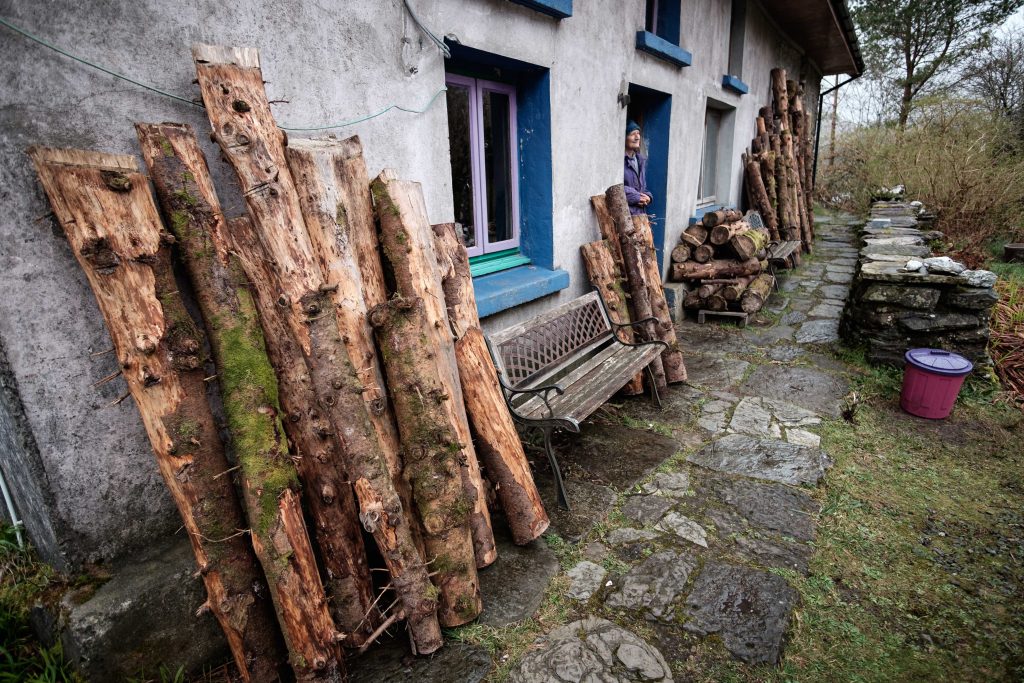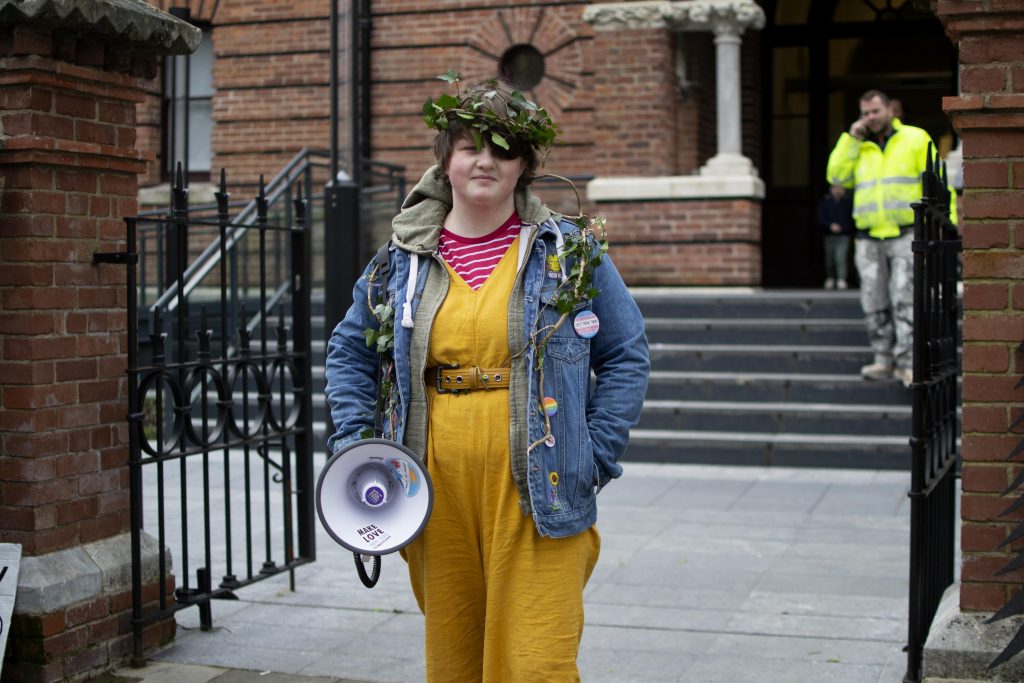Cork ‘earth protector’ granny found guilty of stealing Coillte timber

February 28th, 2020
A grandmother charged with illegally felling conifers in a Coillte forest beside her home in west Cork was convicted of stealing timber worth €500 at the Cork Circuit Criminal Court this afternoon.
Sionad Jones of Maughnaclea, Kealkil was found guilty of a charge related to the dishonest appropriation of wood and admitted that she was using the wood as “harvest fuel” and that she was burning the wood in her stove.
She was not found guilty, however, of inflicting criminal damage by felling 250 trees and ringbarking another 250 for removal between 2 November and 4 December 2018.
Speaking during proceedings yesterday, Ms Jones, 61, said that she was defending biodiversity and the livelihood of species by sawing down Sitka Spruce trees on Coillte land and replacing them with “native” trees.
Ms Jones, who told the jury yesterday that she was not a criminal but a “conscientious earth protector”, claimed that the conifers were harming the environment and polluting her water supply.
This morning, Ms Jones’s barrister Peter O’Flynn asked the jury to consider if the defendant had indeed dishonestly appropriated the wood. Mr O’Flynn described his client as “passionate” and that she has not repossessed the wood in secrecy and that “Coillte were aware of her activities to some extent.”
Judge Seán Ó Donnabháin said, however, that one cannot be the “protector of environment with a chainsaw in one hand and a burning log in the other”. Ms Jones promised to stop felling spruce and appropriating the wood without Coillte’s permission.
Judge Ó Donnabháin adjourned the case until October 30 to see if she will follow the court’s direction to desist from her actions.

Clothes covered in sawdust
During the opening day of the hearing yesterday, Donal Murphy, a forestry worker with Coillte, told the court that he discovered spruces that were both cut and ringbarked by Ms Jones on 4 December 2018 after following up on reports of chainsaw activity in the area.
Mr O’Flynn asked Mr Murphy if the spruces were sprayed with chemicals that could jeopardise the safety of the area’s water supply. Mr Murphy replied that he wasn’t aware of spraying activity and that the area in question was a “free-growing forest” in little need of chemical attention.
Garda Fintan Coffey from the Bantry station, who was dispatched to the scene on the morning of 4 December 2018, testified that Ms Jones stepped out of her green Toyota Starlet to meet him at the scene with her clothes covered in sawdust.
He said he “observed” that there was a chainsaw inside her car and that she told him she was felling spruces that morning and that she knew her actions were “illegal”. “She was very upfront about it,” Garda Coffey added. Ms Jones later denied any admission of guilt.
Garda Coffey continued that Ms Jones had told him she was “worried” that the spruces were not “good for the local environment”. He added that when he visited Ms Jones’s home, he “observed a considerable amount of firewood”.
The defendant was then invited to Bantry station, Garda Coffey said where Ms Jones said that she was replacing spruces with “better” and “proper” trees according to a transcript of her cross-examination read to the court. “I apologise if I have caused stress for Coillte employees, but I have done this with my best of intentions,” Ms Jones said, according to the transcript.

Denial of any wrongdoing
When Ms Jones, who is originally from Wales, was called to testify, she denied any wrongdoing. The defendant said that she had moved to the area in 1987, living off the natural environment with no electricity or indoor plumbing.
The defendant claimed that Coillte acquired land in 1995 that she has used to forage for food to live on, namely berries, nuts and mushrooms. Coillte, she said, turned the land into hundreds of acres of “mono-culture” non-native spruce forest.
“When they planted the spruce, it became dark, all plants died, all flowers died,” Ms Jones claimed. “I was shocked. I was outraged. I was appalled.”
She claimed that her primary intention for felling was to “let light into the bilberry bushes” but “the more I did it, the more I realised that I was helping the biodiversity.”
Ms Jones claimed that the water in her well was being acidified by the spruce trees growing above and that she was replanting broadleaf trees to alkalise the soil. No evidence to back up those claims was presented to the court, however.
A recent NPWS report found that our forestry model is a significant threat and pressure on habitats and species protected under EU law.
The EPA has also found that afforestation and harvesting can impact soils and biodiversity, as well as water quality through acidification and nutrient run-off.

‘Public duty to protect biodiversity’
Ms Jones argued that under EU regulations, Coillte had a binding responsibility for planting native trees and that it had failed to meet European biodiversity objectives.
Brendan Kelly, the prosecution barrister, asked Ms Jones whether she acknowledged Coillte’s ownership of the land to which the defendant replied that it was funded by the public to “manage” the site “on behalf of the people of Ireland”.
Ms Jones reasoned that since Coillte was a “State-funded body”, the public had the right to cut down or replant trees on its property and that she had replanted almost 100 native trees in the area.
When Mr Kelly questioned the defendant about her alleged admission of guilt to Garda Coffey, Ms Jones denied the allegation, arguing that the garda had “misinterpreted” her earlier remarks. “I was referring to the spruce trees that they were against the law. I never said that what I did was illegal,” she claimed.

Extinction Rebellion support
Dozens of Extinction Rebellion members as well as prominent teenager climate striker Saoi O’Connor, held a vigil outside the courthouse in support of Ms Jones yesterday during the opening day of the hearing. One of the organisers, Lucy Smith from Ballydehob, said that Coillte’s sustainability claims are “just an example of green washing”.
“Any areas offered to biodiversity are token gestures and badly managed. Coillte owns seven per cent of Ireland’s land. We therefore believe that they have an ethical responsibility to turn over more land for biodiverse habitats,” she added.
In a statement to The Green News, a spokesperson for Coillte said that the organisation will pursue legal action against anyone who engages in illegal tree felling activities, and that the organisation is fully committed to sustainability and biodiversity of its forests.
“We manage over 90,000 hectares of our lands exclusively for nature conservation and biodiversity. These lands contain broadleaf forests of native tree species and other important habitats for wildlife,” the statement reads. “We continue to invest heavily into the restoration and management of these key biodiversity habitats,” it continues.
At just 11 per cent (around 770,000 hectares), Ireland has one of the lowest levels of forest cover in Europe, yet also has one of the highest rates of plantation forestry across the bloc. Only around two per cent of the country is covered by what is termed native or semi-natural woodland.
The Government recently outlined a new planting target of 22 million trees every year for the next two decades. It is planned that short-rotation conifer plantations will account for 70 per cent of new afforestation, and the remaining 30 per cent of the trees will be broadleaves.
[x_author title=”About the Author”]







